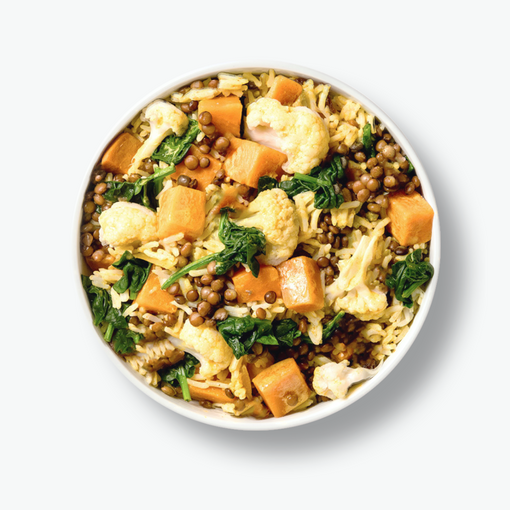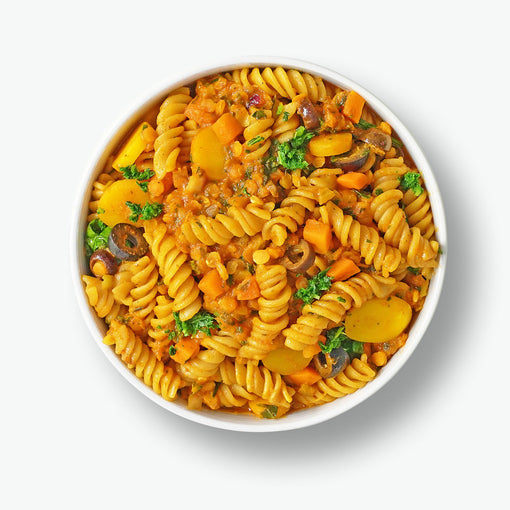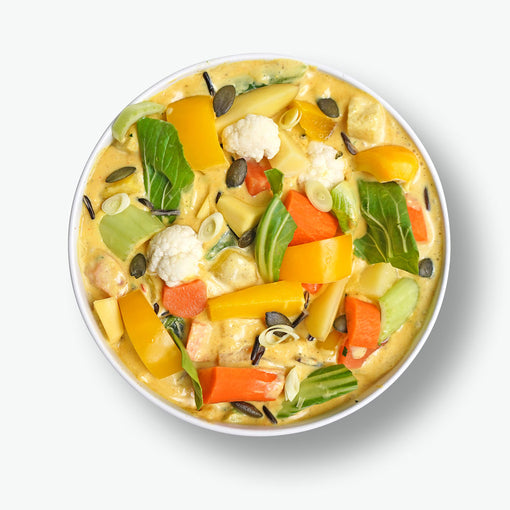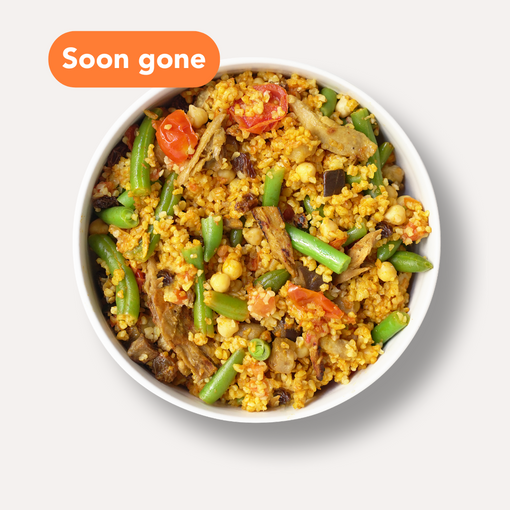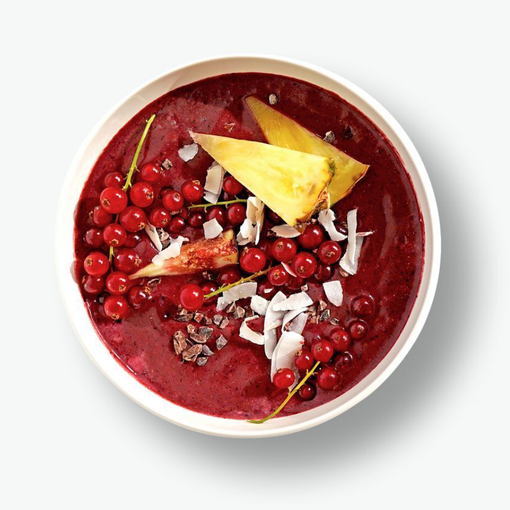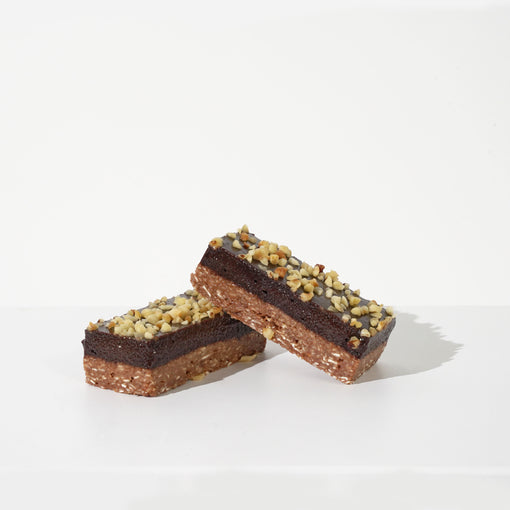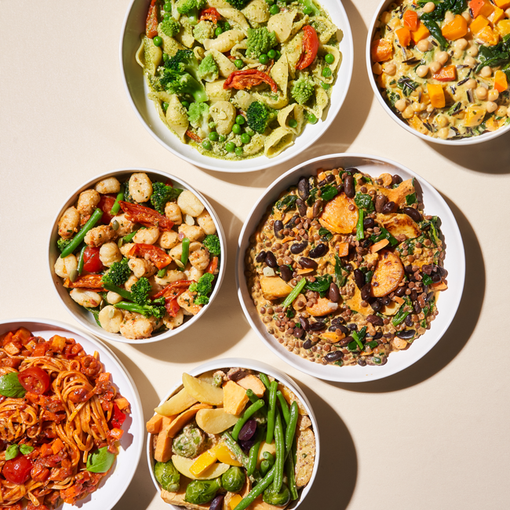Voeg {{ number }} producten toe en bespaar {{ price }}
0
nog 1 Product voor gratis verzending (bespaar € 5,99)
Healthy and Long-Term Weight Loss
We'll show you how you can sustainably achieve your weight goals through a balanced diet.

Healthy weight loss – how does one go about it?
Low-carb, Dukan Diet or weight loss during sleep. Nowadays there are countless diets available, suitable to any lifestyle or preference. As different as they appear to be, the routine is fairly similar: taboo on carbs and your favourite meals are forbidden in order to shed a few kilos.
However, in the case that you deviate from this uber disciplined plan, comes the formidable, yet predictable, yo-yo effect and the kilos are back on in no time. Does this mean that we’re stuck in some kind of diet-limbo? Thankfully not. We’ll show you how you can lose weight sustainably (and keep it off!) with a healthy and balanced diet.
Topics covered in this article:
- Balance instead of diet!
- Long term weight loss with the right foods
- Our tips for a balanced and delicious diet
- An all-round healthy lifestyle
- Eat right for your body and mind
- Sleep and weight loss
- Goodbye to cake, sweets and chocolate?
Balance, not diet!
What does it mean to have a balanced diet and how does it actually work? Simple, a balanced diet relies on diversity. Nothing is forbidden or labeled as ‘bad’--porridge for breakfast, a raw cake with your coffee break, a veggie bowl for dinner. You eat what you feel like eating. What’s important, is that you keep a balance and focus on moderation.

A balanced diet has the ultimate goal of providing the body with sufficient amounts of all the important and essential nutrients that it needs. This highlights the problem in many conventional diets: eliminating certain core foods. For example, sugar and carbs are the enemy, and caloric or fat-containing foods are also forbidden. Labelling many foods we love as absolute no-go’s is never particularly constructive. As many of us know, what we can’t have, we want more of. Because the forbidden fruit tastes the sweetest!
How can you do it better? Simple: combine different food groups in your diet plan and consume these in the right amounts. Ideally, ¾’s of your food should consist of vegan foods (fruits and vegetables). These are high in vitamins and minerals and low in calories. Animal products are also included to cover your daily need of fats and proteins. Even carbs are allowed, if not encouraged!
The Food Pyramid 
Last but not least, listen to your body! It will signal to you pretty clearly what kind of nutrients it's missing, and which foods are beneficial to your health. This form of listening to your body is known as intuitive eating. Discover more about that in detail here.
The key to long-term weight loss: balance
Most of us have probably heard of the latest diet crazes, the hottest new food trends that take Hollywood by storm and promise drastic results in short periods of time. What do most of these diets have in common? They rely on calorie deficits. This is a logical approach is true: if we consume less calories than we burn, our body is supplied with less energy and therefore relies on its own resources (fat and muscles) which leads to weight loss.
To lose weight effectively and sustainably, a daily calorie deficit of 300-500 calories is recommended. If more calories are saved, your metabolism slows down which can then lead to flashes of snack cravings, which will lead to over consumption of calories–a typical side effect of crash diets. So if you want to lose weight sustainably, starving yourself is not going to help achieve your goals. A healthy diet and an active lifestyle are critical.
The topic of weight loss or calorie deficits is often centred around your Body Mass Index (BMI). This calculation measures your height against your weight and classifies you in ‘healthy’ or ‘unhealthy’ weight class. However, this ignores a multitude of other factors that are essential in determining health. BMI can give a data point, but we don’t believe that this is very meaningful or insightful information, a number can’t say it all. For this reason we will not dwell on the BMI calculation further.
Our tips for a balanced diet
1. Time to get cooking!
It's no secret that many of us have quite a one-sided diet, meaning we eat a lot of the same foods, on repeat. Between jobs, family, friends, a social life there's often little time leftover for a thorough preparation of healthy meals and coming up with exciting, nutritious, new recipes. What happens when we’re hungry but don’t have enough time to cook? We tend to fall back on snacks that are quick to prepare, but maybe not the healthiest or conducive to a weight loss journey. This is not a problem if it happens from time to time, (who doesn’t love the occasional cheese toast?), but long term your body won’t be supplied with the necessary nutrients that it needs and your weight loss goals will be less achievable.
This is a real shame, not only because cooking can be fun, it's a great opportunity to tear yourself away from your desk, your tasks and your stress for a few minutes. Chopping vegetables, preparing, stirring, waiting…did you know that cooking can be an excellent form of meditation? But alas, cooking during the day is an activity most of us dream of having the time for, but in reality is simply not in the schedule. However, you need not despair. For moments where you have no time, but don’t want to compromise on the quality of your diet, our selection of bowls, soups, smoothies etc. are here to save the day! Done in under 10 minutes….even the shortest lunch time can make room for that!

2. Fill your plate with colour
Lots of fruit and vegetables are key in a balanced diet. Not only are they vibrant and colourful, but they are filled with essential nutrients. Vitamins, antioxidants, fibre, minerals, trace elements…you name it. Furthermore, fruit and vegetables are typically low in calories and fat– a real win win!
How much fruit and vegetables should you eat a day to maintain a balanced diet? Generally, it is advised that 3 portions of vegetables and 2 portions of fruit should be eaten every day. Our tip: try and select regional and seasonal produce. This is not only more sustainable, but also tastes better! Don’t have any fruit at home? A handful of nuts is also a great source of energy and nutrients. Legumes such as beans, peas and lentils are rich in fibre and protein and should definitely not be left out of your diet plan.
3. Protein – more than a muscle-maker!
Protein is found in many animal products (e.g. meat, fish, eggs, dairy products) but lots of plant based ingredients are high in protein. These include: chickpeas, seeds, nuts and broccoli.
But why are proteins important? And what are they exactly? Proteins, in addition to carbohydrates and fats, are three macronutrients that make up the largest components of our diet. Proteins support the maintenance and development of muscles and organs. They consist of long chains of amino acids that vary in length. In total there are 20 different amino acids. Many amino acids are produced by the body, but 9 out of 20 are not, and therefore need to be supplemented through our food choices.
If you want to lose weight, then you absolutely need to include proteins in your diet. These also help prolong the feeling of being full and support your metabolism.
4. Fats ≠ fat
Fats are deemed as an absolute taboo when it comes to weight loss, because the assumption is if it includes fat, it will make you fat. The food industry supposedly has the ideal solution for this: fat-free or light products! On the surface these might seem like a miracle option: the same product you love, but minus all the ‘bad’ stuff. However, if you scratch below the surface, you realise this is actually far from the truth. In order to maintain a pleasant flavour, light or fat free products replace the fat with sugar or artificial sweeteners, which in turn can actually cause weight gain and not loss.
In reality, some fats can actually promote fitness–yes, you read that correctly! You want to power through your working day or try a new tough workout? You want to keep your hormones in balance? Then you should reach for unsaturated fats such as fish, nuts, avocados or olive oil. They are not only nutritious, but the fat content helps keep you feeling full and avoid midday snacking!
What many don’t know, is that fats act as an important energy source and possess important biological functions. Fats are used for your cell membranes (to protect your cell structure) and also play a crucial role in the production of testosterone. In addition, fats are essential to promote the absorption of vital nutrients.
So next time you’re about to eat a vegetable, let's say a carrot stick, plainly, try drizzling some olive oil over it. This will ensure that the absorption of Vitamins A, D, E and K into your system.

5. Low carb? No, hello carbs!
Low carb diets (cutting out all carbohydrates) do in fact lead to weight loss. But let’s be honest, who wants to spend their life saying no to bread, pasta or chocolate? Nobody! Life is too short to go without these delicious foods. But here again, balance and moderation are the key to success. Because the culprit behind love handles, a muffin top or a double chin are not carbs themselves, but the types and the quantities in which we consume them.
Carbohydrates are a fast-releasing source of energy, and, as mentioned, are a type of macro nutrient. In addition to energy, they are also a source of fibre which is important for your digestion. Similar to good and bad fats, there are also good and bad carbs. Refined carbs, or carbs that contain white flour, are higher in sugar and lower in fibre. If you eat a lot of these, then your blood sugar will spike and cause you to be hungry again shortly afterwards. Instead, you should swap out refined carbs for whole grains and fruit. Find a helpful list of groceries with which you can stock your kitchen and put you on the path of a balanced, diverse diet.
6. Macro and Micro-nutrients: you need both!
Macro and micro nutrients are a fundamental part of your daily diet and fulfil a variety of life-essential biological tasks. As mentioned, there are three macronutrients: fats, carbohydrates and protein.
Micronutrients are a bit harder to count, there’s a lot of them. The most well known are vitamins, trace elements, minerals and secondary plant compounds. They are all essential for your health and support your metabolism, your immune system and the formation of bones. Many micronutrients are found in fruits and vegetables such as apples, berries or spinach. Buying produce that’s currently in season is also an excellent way to ensure that the vitamin and mineral content will be high (nutrient profile sinks through lengthy storage or transport).

7. Stay hydrated!
Even though we’re talking about eating and food a lot, let’s not forget that drinking is a major part of a healthy diet. A staggering 70% of our bodies consist of water (!) and we need to make sure that we drink enough to maintain optimal health.
Fluids such as plain water, tea or unsweetened drinks are important in order for our cells to be provided with the nutrients and energy we ingest via our food. Without enough water, many of our metabolic processes would function less well. In addition, our body expels large amounts of liquid each day, in order to free our body of harmful toxins, so we need to make sure that the amounts that leave our body are refilled. Long term insufficient water intake can cause dehydration. This not only causes physical harm, but can also affect our mental state and cause concentration issues, fatigue and headaches.
How much water should you drink each day? This depends on a variety of factors, such as your weight, how active you are, and the temperature of the climate you are in, but a general good rule of thumb is about 1,5-2 litres of water per day. Spice up your water with these refreshing hacks.
An all-round healthy lifestyle
If you want to lose weight and keep it off, being active is an unavoidable component. Remember the calorie deficit that we mentioned earlier? Physical activity helps achieve this faster. Whether you go for a brisk walk, take up yoga or start jogging, the choice is yours. The important thing is that you find an activity that you enjoy to help keep you motivated, and therefore keep you active! In addition to burning calories, you’ll tone your body and increase your happiness. Exercise releases happiness hormones like Endorphins which positively influence your mood and can help combat mood swings and depression.

Feed your body, and your mind
How to stay fit mentally? Many people will say that good sleep and meditation are essential here. This is true, but so is a healthy diet. Let’s take a brief walk down memory lane. Remember the last time you paid a visit to your favourite burger-joint? It was undoubtedly delicious, but 30 minutes or so after, feelings of fatigue and sluggishness took over. This indicates how powerful the effect food has over our mood, our feelings and our productivity. Supplying our brains with the right kind of fuel, aka food, is therefore essential for maintaining good mental health.
Our brain uses glucose as its main source of energy, which is found in carbohydrates. But also healthy fats, like olive oil, salmon, mackerel or herring are foods our brain flourishes on. This is because they contain omega-6 and omega-3 fatty acids which are important for the production and function of cell membranes in our brain. Individuals who have a very one sided diet or unbalanced diet risk compromised brain function.
Sleep and weight loss
Sleep is vital for our health. Many important bodily functions take place while we sleep. Only those who sleep enough have sufficient energy to function well throughout the day. We all know the horrible feeling of starting the day grumpy because we didn’t sleep enough. We feel drained and exhausted and the simplest task turns into a challenge. Sleep deprivation not only affects our energy levels but also has negative effects on our weight loss goals.
How much sleep you need depends on a variety of factors like your age, activity level and how healthy you are. Generally, getting between 7-9 hours of sleep per day is ideal. But what happens when we sleep? Do we really lose weight while we’re asleep? Yes and no. Just cause you slept 8 hours unfortunately doesn’t mean that you’ll achieve your goal weight, but sleeping well will help make your goals achievable and realistic. Find a guide on how to get better sleep here.
Recent studies have shown that when we sleep, the hormone Leptin is released. This is responsible for causing feelings of fullness and satiety. Simultaneously, the hormone Ghrelin which controls our appetite, is suppressed. So if we don’t sleep enough, it's likely that we’ll wake up feeling hungrier and will therefore eat more than we normally would. Furthermore, Ghrelin slows fat burning which is evidently necessary for weight loss.

Goodbye cake, chocolate and sweets?
A balanced and diverse diet will supply your body with the necessary nutrients and energy that it needs to be highly productive. Extremes–whether it is too much or too little of one thing– are often a weight loss killer. We know it too well, if we’re told we can’t have something, we want it even more.
That’s why it's perfectly ok to occasionally munch on some chips or chocolate cookies. Denying yourself all the things you love, takes the fun away from eating and decreases the chances that you’ll stick to your diet plan. At the end of the time, it's essential to have a good understanding of the foods that are good and bad for you, as well as the ones you simply can't live without. Eating in moderation and paying attention to quantities is the key to success. Finding the fun, the right balance, and listening to your body is instrumental to staying disciplined and achieving long term change.
More interesting content:
- Brain Food – Natural Power for Your Brain
- Nutritious Eating During Postpartum Recovery
- Art of Yoga – How to Bring Body and Mind into Harmony
- Vegan Protein Sources – The Key Facts
- Naked Falafel Salad
For even more foodie-content follow us on Instagram and join the Facebook Community to get involved in meal creations and to stay up to date on all things Every.

